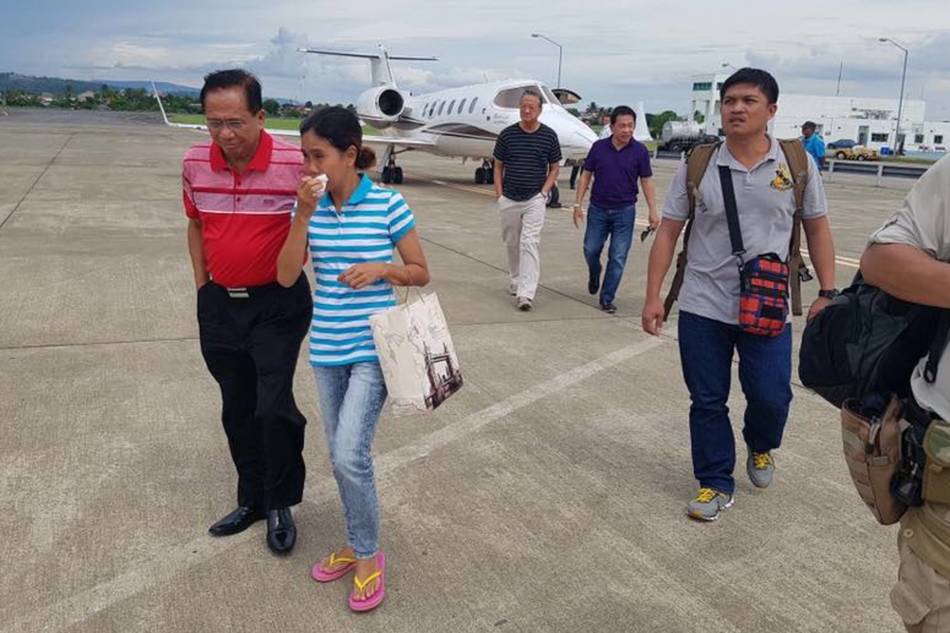Duterte negotiating for release of Norwegian hostage

Welcome, Kapamilya! We use cookies to improve your browsing experience. Continuing to use this site means you agree to our use of cookies. Tell me more!
Duterte negotiating for release of Norwegian hostage
Dharel Placido,
ABS-CBN News
Published Jun 24, 2016 05:02 PM PHT
|
Updated Jun 24, 2016 06:43 PM PHT
Release of Filipina hostage was an 'act of goodwill' - Dureza
Release of Filipina hostage was an 'act of goodwill' - Dureza
DAVAO CITY - President-elect Rodrigo Duterte on Friday revealed that he negotiated for the release of Abu Sayyaf hostage, Filipina Marites Flor.
DAVAO CITY - President-elect Rodrigo Duterte on Friday revealed that he negotiated for the release of Abu Sayyaf hostage, Filipina Marites Flor.
Duterte said he also negotiated for the release of another Abu Sayyaf hostage, Norwegian Kjartan Sekkingstad, but this did not push through due to some problems.
Duterte said he also negotiated for the release of another Abu Sayyaf hostage, Norwegian Kjartan Sekkingstad, but this did not push through due to some problems.
"Kidnapping must stop because it has given us a very bad image," he said.
"Kidnapping must stop because it has given us a very bad image," he said.
Incoming presidential peace adviser Jesus Dureza said the release of Flor was an "act of goodwill" from the Abu Sayyaf.
Incoming presidential peace adviser Jesus Dureza said the release of Flor was an "act of goodwill" from the Abu Sayyaf.
ADVERTISEMENT
He said the release of the Norwegian is still being worked out.
He said the release of the Norwegian is still being worked out.
He said Sulu Governor Abdusakur Tan was also instrumental in Flor's release.
He said Sulu Governor Abdusakur Tan was also instrumental in Flor's release.
Dureza said Flor, 38, will return to her hometown in Valencia, Bukidnon.
Dureza said Flor, 38, will return to her hometown in Valencia, Bukidnon.
Flor's release came more than 10 days after the bandits beheaded Flor's partner, Canadian Robert Hall, after a P300 million ransom for his release was not paid. The Abu Sayyaf also executed Canadian John Ridsdel, a former mining executive, in April.
Flor's release came more than 10 days after the bandits beheaded Flor's partner, Canadian Robert Hall, after a P300 million ransom for his release was not paid. The Abu Sayyaf also executed Canadian John Ridsdel, a former mining executive, in April.
ADVERTISEMENT
Ridsdel, Canadian Robert Hall, Sekkingstad and Flor were seized from yachts at a marina in Samal Island in Mindanao on September 21, 2015.
Ridsdel, Canadian Robert Hall, Sekkingstad and Flor were seized from yachts at a marina in Samal Island in Mindanao on September 21, 2015.
The bandits initially demanded P1 billion each for the detainees, but it lowered the ransom to P300 million each early this year. Both the Philippine and Canadian government, however, reiterated a policy against paying ransom in these cases.
The bandits initially demanded P1 billion each for the detainees, but it lowered the ransom to P300 million each early this year. Both the Philippine and Canadian government, however, reiterated a policy against paying ransom in these cases.
Founded in the early 1990s with seed money from Al-Qaeda chief Osama bin Laden, the Abu Sayyaf gained international notoriety for kidnapping dozens of foreign tourists for ransom in the early 2000s.
Founded in the early 1990s with seed money from Al-Qaeda chief Osama bin Laden, the Abu Sayyaf gained international notoriety for kidnapping dozens of foreign tourists for ransom in the early 2000s.
The group has also been blamed for the country's worst terrorist attacks, including the bombing of a ferry off Manila Bay in 2004 that killed more than 100 people.
The group has also been blamed for the country's worst terrorist attacks, including the bombing of a ferry off Manila Bay in 2004 that killed more than 100 people.
It is believed to have just a few hundred gunmen, but thrives in lawless sections of the southern Philippines where Muslim rebels have for decades fought for independence or autonomy. With reports by Agence France-Presse and Reuters
It is believed to have just a few hundred gunmen, but thrives in lawless sections of the southern Philippines where Muslim rebels have for decades fought for independence or autonomy. With reports by Agence France-Presse and Reuters
ADVERTISEMENT
ADVERTISEMENT



